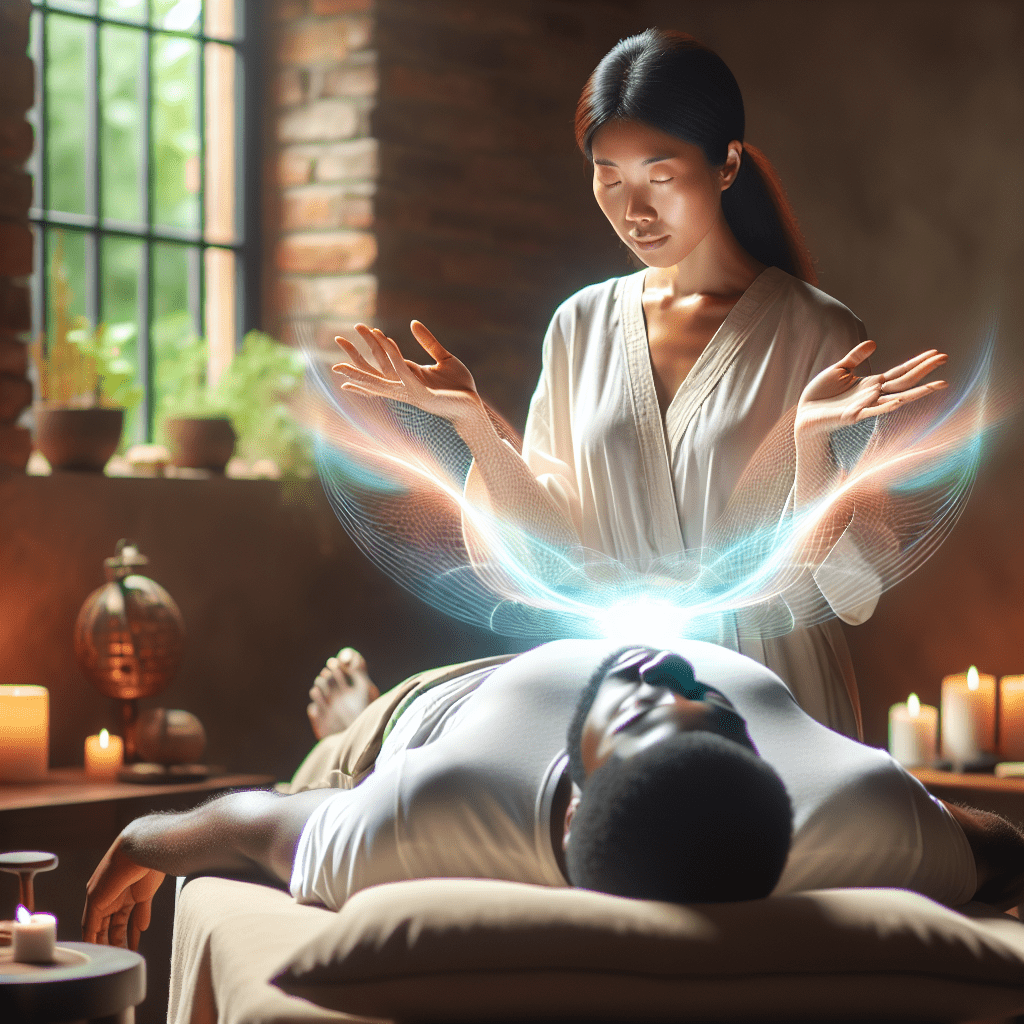Have you ever felt that something was missing in your health journey? Despite following all the “right” advice, perhaps you’re still struggling with nagging health issues or just not feeling your best. The answer might lie in a concept that’s been around for thousands of years but is only now gaining recognition in Western health circles – the balance of Yin and Yang.
The Ancient Wisdom of Balance
Traditional Chinese Medicine (TCM) has long understood health through the lens of Yin and Yang – two complementary forces that govern all aspects of life and nature. This isn’t just an abstract philosophy; it’s a practical framework for understanding health and wellness that has guided Eastern medicine for millennia.
In TCM, Yin represents coolness, darkness, rest, and substance, while Yang embodies warmth, light, activity, and function. Your body is viewed as a microcosm of the universe, with these dual forces constantly interacting to maintain harmony. When they’re balanced, you experience health and vitality. When they’re out of balance, illness and discomfort arise.
“Yin and Yang are the foundation of the entire universe,” explains Dr. Ming Chen, a TCM practitioner with over 30 years of experience. “In the body, these energies must work together harmoniously. When one becomes excessive or deficient relative to the other, we see the beginning of disease.”
This perspective on Yin Yang health offers something profoundly different from the typical Western approach. Rather than viewing health as simply the absence of disease, TCM sees it as an active state of balance and harmony – not just within the body, but between the body and its environment.
Consider how your energy fluctuates throughout the day, or how certain seasons affect your mood and physical well-being. These observations align perfectly with the Yin Yang health concept, which recognizes that our bodies are constantly adapting to maintain equilibrium.
East Meets West: Two Approaches to Health
Western medicine has given us incredible advances in healthcare. With its foundation in scientific research, technological innovation, and evidence-based practices, Western medicine excels in diagnosing and treating acute conditions, managing emergencies, and developing pharmaceutical interventions that can save lives.
When you break a bone, need surgery, or face a life-threatening infection, Western medicine’s approach is unparalleled. Its strength lies in its precision, specificity, and ability to target particular symptoms or conditions with remarkable effectiveness.
However, this approach sometimes misses the forest for the trees. By focusing intensely on specific symptoms or body systems in isolation, Western medicine can occasionally overlook the interconnected nature of our health.
Eastern medicine, by contrast, takes a fundamentally different view. TCM and other Eastern health philosophies approach the body as an integrated whole, where physical symptoms are merely expressions of deeper imbalances. In the Eastern perspective, prevention is paramount, and maintaining balance is considered the true path to health.
“Western medicine asks ‘what disease does this person have?’ while Eastern medicine asks ‘what imbalances does this person have?'” notes Dr. Sarah Johnson, who practices integrative medicine. “Both questions are valuable, but they lead to different approaches and solutions.”
In the Eastern approach, your body’s energy – known as Qi – flows through pathways called meridians. When this energy flow is disrupted or imbalanced, health problems emerge. Treatments like acupuncture, herbal medicine, and qigong aim to restore proper energy flow and balance between Yin and Yang.
This preventive, holistic perspective is where Eastern medicine truly shines. Rather than waiting for disease to manifest, it offers tools for maintaining harmony and addressing subtle imbalances before they develop into more serious conditions.
The Power of Integration
The good news is that we don’t have to choose between these approaches. The most promising frontier in healthcare today is the integration of Eastern and Western practices – taking the best of both worlds to create a more comprehensive approach to health and wellness.
Consider the case of Jennifer, a 42-year-old marketing executive who struggled with chronic migraines for over a decade. “I tried everything my doctors recommended – medications, lifestyle changes, even some experimental treatments,” she recalls. “They helped manage the pain somewhat, but the migraines kept coming back.”
It wasn’t until Jennifer incorporated acupuncture, dietary changes based on TCM principles, and stress-reduction practices that she experienced a dramatic improvement. “My Western doctor identified the migraines and helped manage the symptoms, while my TCM practitioner helped address the underlying imbalances that were triggering them. Together, they’ve given me my life back.”
This complementary approach is becoming increasingly common. Western diagnostics can identify specific conditions with precision, while Eastern practices can address underlying imbalances that contribute to those conditions. Western treatments may target acute symptoms, while Eastern approaches support overall healing and prevent recurrence.
The integration of Yin Yang health principles with Western medicine creates a powerful synergy. For example:
- Western medicine might prescribe pain medication for arthritis, while acupuncture and herbal remedies can reduce inflammation and improve joint function.
- For digestive disorders, Western medicine can rule out serious pathologies, while dietary adjustments based on Yin Yang health principles can restore digestive harmony.
- Mental health conditions might be addressed with conventional therapy and medication, complemented by mindfulness practices, tai chi, or qigong to balance emotional energy.
This integrated approach recognizes that true health isn’t just about treating disease – it’s about creating balance and harmony in all aspects of your being.
The Science Behind the Synthesis
If you’re skeptical about Eastern approaches, you’re not alone. Many Western-trained healthcare providers have historically viewed practices like acupuncture or herbal medicine with suspicion. However, an impressive body of research is now validating many aspects of Eastern medicine.
Studies published in respected journals like JAMA and The Lancet have demonstrated the effectiveness of acupuncture for conditions ranging from chronic pain to nausea and anxiety. Research from Harvard Medical School has shown that tai chi can improve balance, reduce fall risk, and enhance quality of life for people with Parkinson’s disease.
A 2019 systematic review in the British Medical Journal found that integrative approaches combining conventional and complementary therapies resulted in better outcomes for patients with chronic pain compared to conventional treatment alone.
Even the ancient concept of Yin Yang health balance is finding scientific validation. Researchers now recognize that many health conditions result from imbalances in the body’s regulatory systems – the very concept that TCM has emphasized for thousands of years.
Dr. David Eisenberg, Director of Culinary Nutrition at Harvard T.H. Chan School of Public Health, notes: “We’re beginning to understand that many Eastern medical practices that were once dismissed actually work through mechanisms that we can now measure and understand scientifically.”
This emerging research doesn’t just validate traditional practices – it creates opportunities for true innovation in healthcare, where ancient wisdom and modern science come together to create something greater than either could achieve alone.
The Eight Principles: A Framework for Holistic Diagnosis
One of the most fascinating aspects of TCM is its diagnostic framework known as the Eight Principles. This system provides a comprehensive method for understanding health imbalances that goes far beyond simply identifying symptoms.
The Eight Principles consist of four pairs of opposing qualities:
- Interior/Exterior: Is the condition affecting deeper systems or surface areas?
- Hot/Cold: Is there excess heat (inflammation, infection) or coldness (poor circulation, low energy)?
- Excess/Deficiency: Is the problem caused by too much of something or not enough?
- Yin/Yang: Which fundamental energy is out of balance?
By examining these qualities, TCM practitioners can develop a nuanced understanding of what’s happening in your body. Rather than simply treating the symptom, they can address the underlying pattern of disharmony.
For example, two people might experience headaches, but one might have a “hot excess” headache caused by stress and inflammation, while another might have a “cold deficiency” headache related to poor circulation and exhaustion. Despite similar symptoms, these conditions would require completely different treatments.
This approach aligns perfectly with the growing Western interest in personalized medicine. Both systems recognize that each person is unique, and that effective healthcare must be tailored to individual needs and circumstances.
By incorporating the Eight Principles into an integrated approach, practitioners can develop more nuanced, personalized treatment plans that address not just symptoms but the unique patterns of imbalance in each individual.
Embracing a Balanced Approach to Wellness
The journey to optimal health isn’t about choosing between Eastern and Western approaches – it’s about embracing a balanced perspective that incorporates the wisdom of both traditions. This integrated approach embodies the very essence of Yin Yang health – finding harmony between seemingly opposite forces.
At HerbalsZen, we believe that this balance represents the future of healthcare. Our philosophy centers on bridging ancient wisdom with modern innovation, creating accessible tools for people seeking a more holistic approach to wellness.
Our flagship product, EASTCHI AI, exemplifies this integrated approach. By combining the 2,000-year-old wisdom of Eastern medicine with cutting-edge artificial intelligence, EASTCHI AI offers personalized health recommendations based on your unique constitutional type, current imbalances, and health goals.
The system analyzes your health through the lens of Five Element Theory, providing tailored nutrition plans, lifestyle recommendations, and health support that address your specific needs. It’s like having both an Eastern medicine practitioner and a Western health coach working together to optimize your wellbeing.
“What makes EASTCHI AI unique is that it doesn’t force you to choose between approaches,” explains Dr. Li Wang, one of the system’s developers. “It recognizes the value of both traditions and helps you find the right balance for your unique body and circumstances.”
This balance might include:
- Eating foods that support your constitutional type while meeting modern nutritional guidelines
- Combining movement practices that balance your energy with evidence-based exercise recommendations
- Using herbs and supplements that address specific imbalances while complementing any Western medications
- Adopting seasonal practices that harmonize your body with natural cycles
By embracing both Eastern and Western perspectives, you gain access to a more complete picture of health – one that addresses both acute concerns and long-term wellness, both symptoms and underlying causes, both physical health and energetic balance.
In the end, Yin Yang health isn’t about choosing one approach over another – it’s about finding the missing pieces in your health puzzle and creating a more complete picture of wellness. By integrating the best of both worlds, you can discover a more balanced, harmonious approach to health that addresses all aspects of your being.
As the ancient Chinese proverb states, “The journey of a thousand miles begins with a single step.” Perhaps your next step is exploring how this balanced approach might transform your own health journey, bringing together the precision of Western medicine with the holistic wisdom of the East. Your body’s missing puzzle piece might just be waiting to be discovered.




